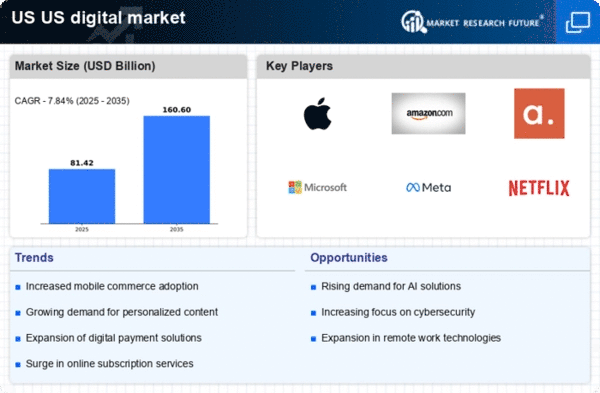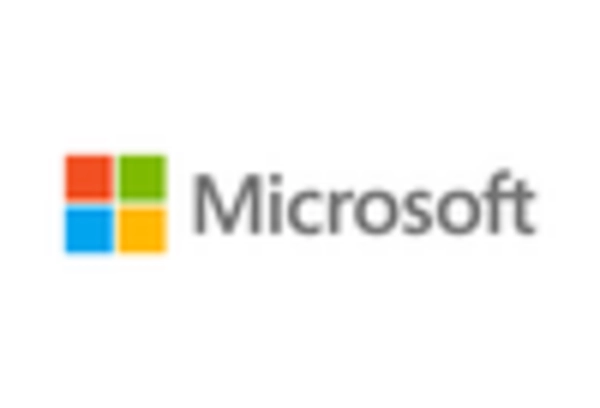Expansion of E-Commerce Platforms
The rapid expansion of e-commerce platforms is significantly influencing the US Digital Marketing Software Market. With more consumers turning to online shopping, businesses are compelled to enhance their digital marketing strategies to capture this growing audience. Data indicates that e-commerce sales in the US are projected to reach over 1 trillion dollars by 2025. Consequently, digital marketing software that facilitates effective online advertising, customer relationship management, and analytics is in high demand. This trend is likely to propel the growth of the US Digital Marketing Software Market, as companies seek to optimize their online presence and drive sales through targeted marketing efforts.
Growing Demand for Personalization
The US Digital Marketing Software Market is experiencing a notable surge in demand for personalized marketing solutions. Businesses are increasingly recognizing the importance of tailoring their marketing efforts to individual consumer preferences. This trend is driven by the need to enhance customer engagement and improve conversion rates. According to recent data, personalized marketing can lead to a 20% increase in sales. As a result, software providers are focusing on developing tools that enable marketers to analyze consumer behavior and preferences effectively. This shift towards personalization is likely to continue, as companies strive to create more meaningful connections with their audiences, thereby driving growth in the US Digital Marketing Software Market.
Emergence of Social Media Marketing
The emergence of social media marketing is a pivotal driver in the US Digital Marketing Software Market. As social media platforms continue to grow in popularity, businesses are increasingly leveraging these channels to reach their target audiences. Data suggests that over 70% of marketers believe that social media marketing has been effective for their business. This trend has prompted software providers to develop tools that facilitate social media management, analytics, and advertising. As companies recognize the potential of social media to enhance brand visibility and engagement, the demand for specialized digital marketing software is expected to rise, further propelling the growth of the US Digital Marketing Software Market.
Regulatory Compliance and Data Privacy
The evolving landscape of regulatory compliance and data privacy is shaping the US Digital Marketing Software Market. With increasing scrutiny on data protection, companies are compelled to adopt software solutions that ensure compliance with regulations such as the California Consumer Privacy Act (CCPA). This has led to a growing demand for digital marketing tools that incorporate robust data security features. As businesses navigate these regulatory challenges, the need for compliant marketing software is likely to drive innovation and growth within the US Digital Marketing Software Market, as companies seek to build trust with consumers while effectively managing their marketing efforts.
Increased Investment in Marketing Technology
There is a marked increase in investment in marketing technology within the US Digital Marketing Software Market. Companies are allocating larger budgets to adopt advanced marketing tools that enhance efficiency and effectiveness. This trend is supported by the growing recognition of the return on investment that sophisticated marketing software can provide. For instance, businesses that utilize marketing automation tools report a 14.5% increase in sales productivity. As organizations strive to stay competitive, the demand for innovative marketing solutions is expected to rise, further fueling growth in the US Digital Marketing Software Market.

















